Los Angeles has joined a growing list of US cities to push for eye-popping slavery reparations payouts to black residents, even without plans for where the money will come from.
The Reparations Advisory Commission released a 56-page report on Tuesday that does not propose a full cost for reparations, but suggests it could run into hundreds of trillions of dollars in America’s second-biggest city.
Black Angelenos typically own just $30,000 in assets — far less than the $335,000 of their white neighbors, says the report.
Levelling up the city’s 332,000 black residents could therefore cost many trillions of dollars, which is far beyond even the plans of the most radical advocates of racial justice.
It far exceeds the city council’s budget, which this year stands at $12.8 billion, and even then faces a multimillion dollar deficit.
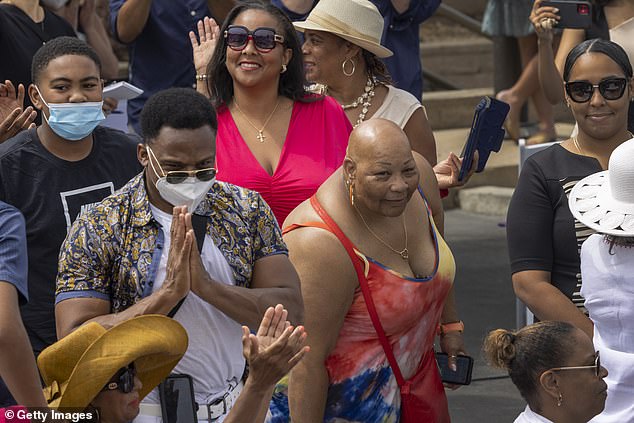
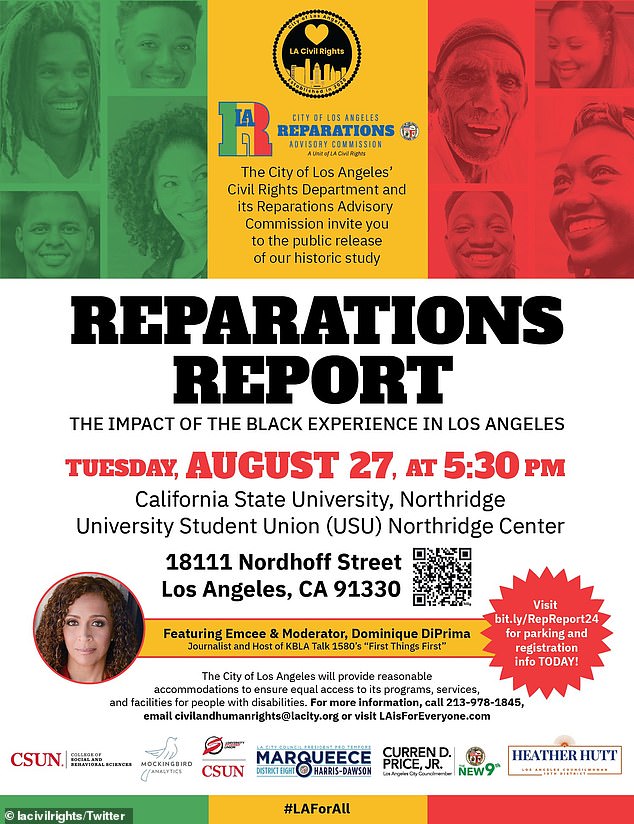
Researchers instead says reparations payouts are a possible answer to the injustices of the past, and could flow directly from federal, state, and local coffers.
It also suggests that black Angelenos could get carve-outs on income taxes and have their debts wiped away.
‘Without exceptional government intervention, it is likely that the wealth gap will continue to grow until the dreams of a life of safety, comfort, and freedom from financial ruin are limited to all but a few,’ says the report.
The study, called An Examination of African American Experiences in Los Angeles, was only an executive summary of the full 400-page report that is set to come out next month.
It involved researchers from California State University, Northridge, polling black LA residents about their experiences, and original historical research on the period from 1930 to 2022.
At the launch, Capri Maddox, head of the city’s Civil + Human Rights and Equity Department, revealed public concerns for reparations for payouts in a city and state with no history of slavery.
California was admitted to the United States in 1850 as a free state and fought on the Union’s side in the Civil War.
The segregation practiced in the South through the 1960s did not exist in California.
‘A lot of people say, `What’s slavery have to do with Los Angeles? What do reparations have to do with Los Angeles?’,’ Maddox told reporters.
‘The dehumanization of people by Jim Crow and other policies like red lining led to some of the challenges we have today in Los Angeles.’
The report identifies a dozen harms black Angelenos have endured, such as impacts from slavery, racial terror, mental and physical injury and neglect.
They’ve also suffered from racism in environmental policies, a biased legal system, housing segregation, stolen land, lost opportunities, poor schools, political disenfranchisement, and a wealth gap, it adds.
‘The effects of historical injustices stemming from slavery have impacted opportunities and outcomes for generations of black people in Los Angeles,’ says the document.
Researchers described how the city was a hub for Ku Klux Klan activity in the 1920s and 1930s, with support from the LA Police Department officers and city politicians.
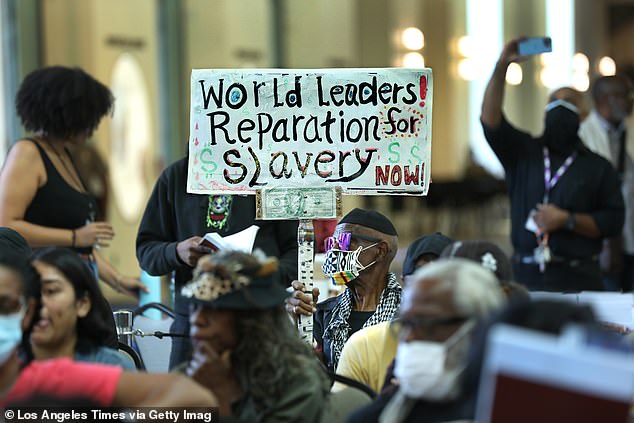


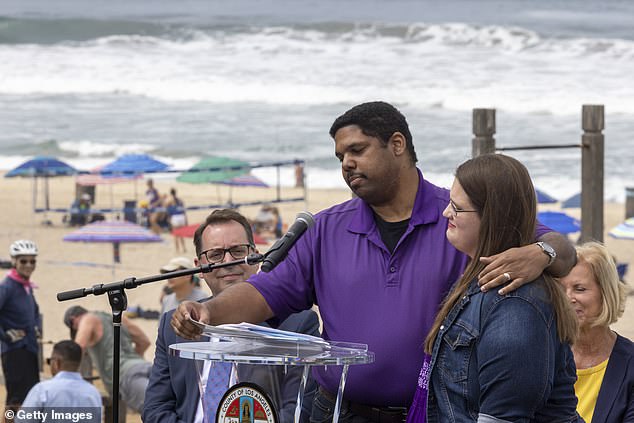
By the 1950s, drug wars in the city disproportionately hurt black neighborhoods, escalating police harassment and arrests, said the commission’s vice chair Khansa Jones-Muhammad, according to MyNewsLA.
Researchers found that black Angelenos faced barriers to housing and home ownership that set them back by $7.2 billion between 1970 and 1990.
The commission recommended that LA issue an official ‘acknowledgement and apology’ for the injustices of slavery and Jim Crow policies, as well as to document the history of slavery in the city.
They referred to a survey of black and mixed-race households that found 76 percent of respondents supported ‘monetary payments.’
Reductions in income taxes for black residents and debt forgiveness were also popular by huge margins, according to the survey of 618 adults.
Researchers did not address who in LA could be eligible for any payouts — which is a divisive issue among reparations activists.
Some campaigners say benefits should flow to those descended from slaves, while others say blacks who migrated to the US in recent decades and others also suffered and deserve compensation.
Los Angeles is among a number of cities, including San Francisco, Boston, and Evanston, Illinois, to launch their own reparations studies.
States such as New York and California have their own initiatives.
California’s Legislature is weighing plans to issue a formal apology for its role in perpetuating discrimination against black residents, to create an agency to administer payouts, and to identify families whose property was unjustly seized.
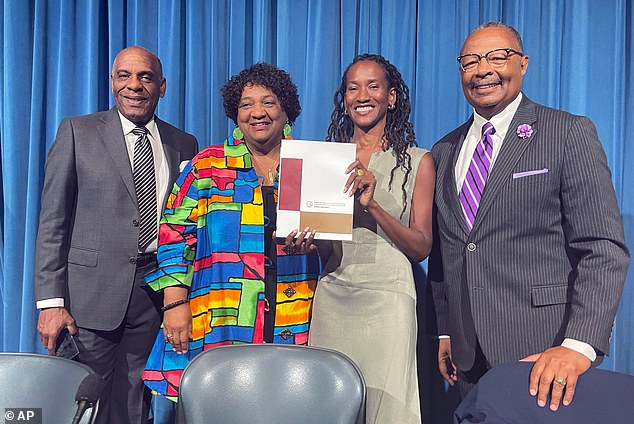
The reparations movement gathered momentum across the US amid the race protests over the police killing of George Floyd in 2020, but progress has stalled more recently.
Campaigners say it’s time for America to repay its black residents for the injustices of the historic Transatlantic slave trade, Jim Crow segregation and inequalities that persist to this day.
The sums are eye-watering — black lawmakers in Washington seek at least $14 trillion for a federal scheme to ‘eliminate the racial wealth gap’ between black and white Americans.
Critics say payouts to selected black people will inevitably stoke divisions between winners and losers, and raise questions about why American Indians and others don’t get their own handouts.
Reparations are popular among the black people who stand to benefit from them, but unpopular among the whites, Asians, and others who would foot the tax bill without themselves benefiting.
Fully 74 percent of blacks support the US government reparations for slavery and its legacy, compared with just 26 percent of whites, according to a Reuters/Ipsos survey from last year.
Reparations are much more popular among Democrat voters than with Republicans.
From the 15th to the 19th century, at least 12.5 million Africans were kidnapped, forcibly transported by European ships and merchants and sold into slavery.
Those who survived the brutal voyage ended up toiling on plantations in the Americas, including in Brazil, the Caribbean, and the United States, while others profited from their labor.


